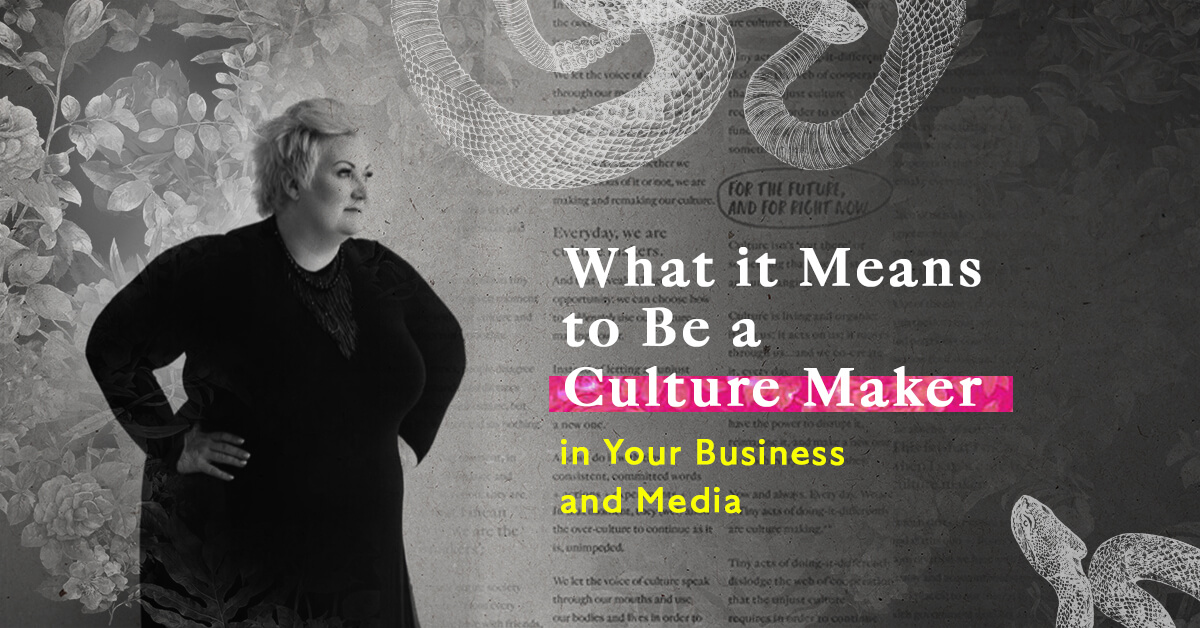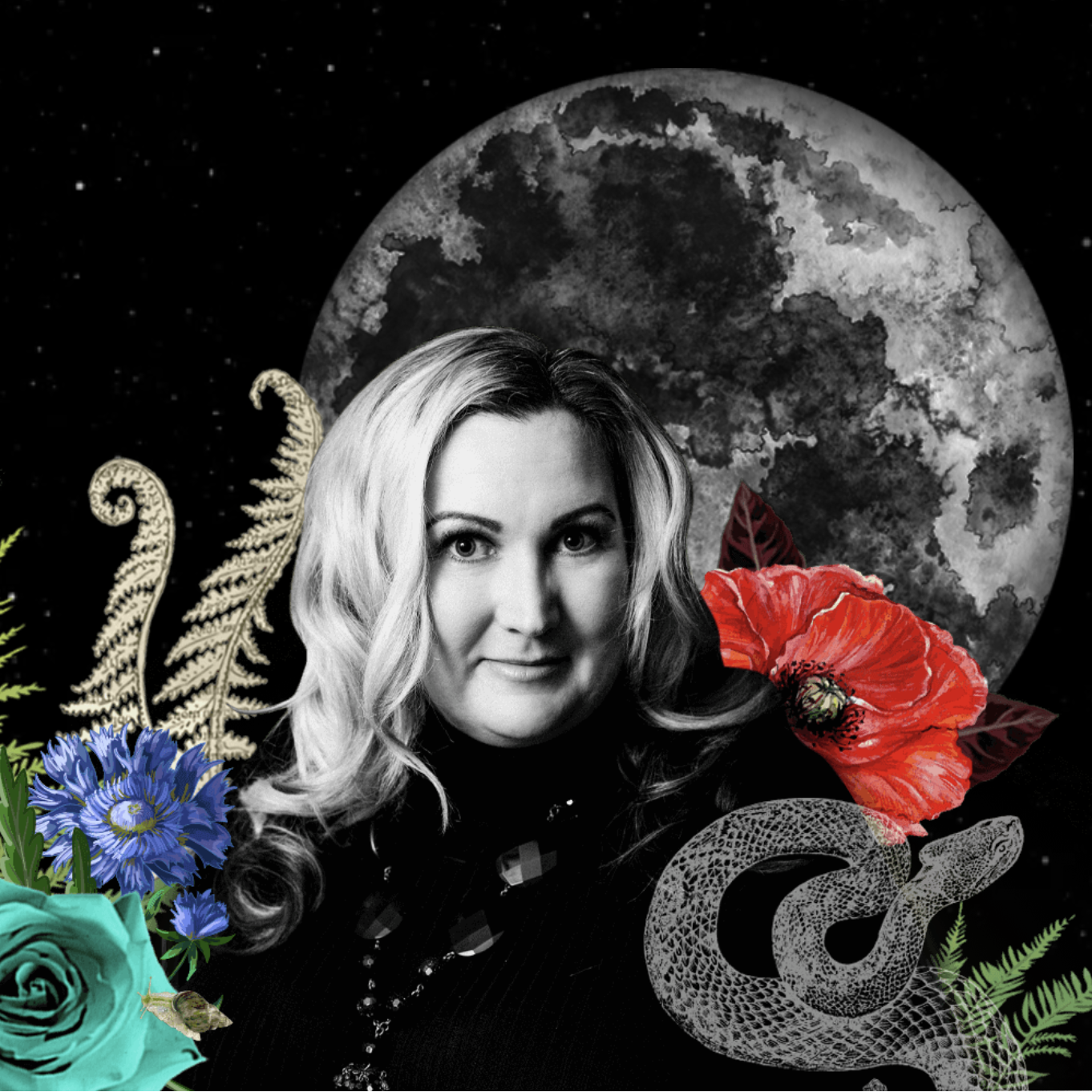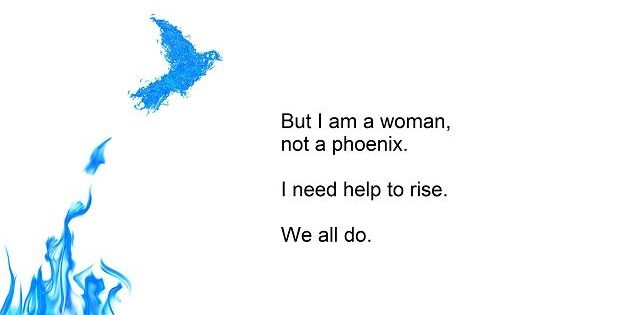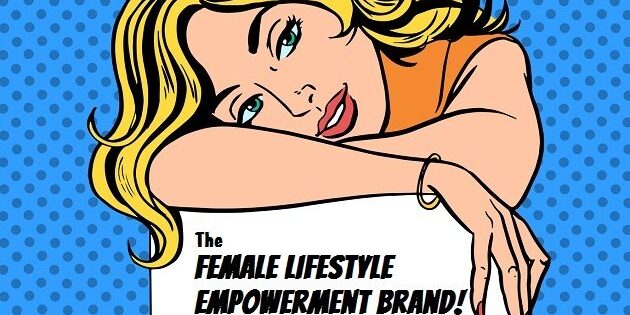
What it Means to Be a Culture Maker in Your Business and Media

On my website, the first thing you’ll see is the statement: “We are The Culture Makers”.
I say this because it’s true. We have the power to create change and to create a just culture.
In our interactions with each other, with friends and family, with power and authorities, online, and professionally, in our businesses and our platforms: we can interrupt the cultural norms we don’t consent to, and we can create new ones.
Culture is not static, it is ever-changing, it is being remade every day, and it cannot exist without us.
Each and every single person is a culture maker.
Our project is to be deliberate culture makers.
In order to be deliberate culture makers, we commit to taking responsibility for the impact that our work, businesses and marketing practices create in our culture.
We commit to questioning and critiquing our current marketing practices, pinpointing how they reinforce conditions we oppose, and experimenting with alternatives.
We commit to unlearning marketing and social norms — otherwise we’ll be using our own lives and work to inadvertently foster the very conditions we want to dismantle.
We commit to deliberately selecting marketing and business practices and fostering interpersonal and collective dynamics that change social norms and conditions.
We commit to using our power, platforms and professional contributions towards changing our culture.
This is how we use our own lives & platforms as our individual and collective contributions towards a more inclusive and just culture.
The project of being professional, deliberate culture makers is not based on shared values or internal commonalities. It’s based on commitments. We don’t have to be the same or think the same. We don’t have to strive for consensus or comfort. Instead, we can embrace the diversity of perspectives and lives as opportunities to learn from each other and expand our thought horizons; and use the way we might feel personally challenged and uncomfortable as fuel to invent new practices — and a new future.
To connect the dots between our individual marketing practices and their social impact, align our personal commitments with our consequences, and catalyze our work, I’ve developed a tool I call The Female Lifestyle Empowerment Brand (FLEB).
Culture making is the centre of the critique I make about The Female Lifestyle Empowerment Brand.
And although this is a critique, it comes from a place of love.
I love empowerment. I have loved the iconic online and cultural leaders preaching female empowerment. These online spaces, blogs, leaders, courses and teachings have changed my life.
They have grown me, and then they broke my heart.
So many of them styled themselves as world-changers and empowerers, and I believed it. But when I looked to them over the last three years for leadership on substantive cultural issues, it was not forthcoming.
I believe that’s because there is a tension between their postures and language and their actual marketing and business practices — especially around empowerment.
Empowerment means changing the social conditions so that there are no impediments to the rise of women and marginalized people, not just as individuals, but as collectives. Instead, what is modeled to us as empowerment is training to access the current system from which we’re usually excluded.
A committed world-changer and a culture-maker does not accept the current system as it is.
They commit to changing it.
This tension — between the strategies that produce collective change vs those that create individual success without systemic change — is arguably why some of the online marketing norms taught in our empowerment spaces make culture-makers and change-makers uncomfortable.
As they should: launch formulas and online marketing and codified social triggers were literally invented by patriarchs and pick-up artists — in other words, by people comfortable with leveraging and profiting financially or sexually from other people’s oppression — and then mastered by some of our most famous women business and marketing leaders and taught to a new audience: us.
The lineage of the marketing practices taught and practiced in women’s empowerment spaces can be traced back directly to people we would never, ever partner with or support.
Committed culture-makers and marketers with non-dominant identities will often intuitively recoil from these tactics because we can’t quite avoid the fact that they are predatory or manipulative or bolster the very social attitudes and oppressive dynamics we want to eradicate.
The result of these mainstream marketing formulas may ‘work’ — it may create sales and profits — but leveraging oppressive tactics does not create collective empowerment. It creates personal revenue.
And this is what I tried to name by mapping out The Female Lifestyle Empowerment Brand.
The Female Lifestyle Empowerment Brand = The Unjust Status Quo
The Female Lifestyle Empowerment Brand is a tool we can use to name and reject the dominant, oppressive cultural norms taught to us in the form of marketing processes. It has four pillars, each of which takes on a marketing/culture pattern:
1) It’s an analysis of the conventional femininity women are required, culturally, to perform in order to be successful — and how that prescription of femininity necessarily excludes anyone who is not thin, white, young, able-bodied, heterosexual, likable and pretty.
2) It’s an analysis of the mainstream marketing practices that specifically leverage oppression — practices that were developed by patriarchs and pick-up artists, adopted by many female marketing/success teachers, and then diffused through their online schools and academies to aspiring women & femme entrepreneurs.
3) It’s an analysis of the racial and class privilege embedded in lifestyle marketing and the way it was designed to manufacture authority and obedience by signalling hierarchy and status.
4) It’s an analysis of the way ’empowerment’, which originally collective, systemic intervention in the social conditions producing poverty and disenfranchisement AND personal navigation and success strategies, has been co-opted and collapsed to mean *the success models that individual (white) women can follow to become the exceptional woman who achieves personal wealth and social status in our current culture*.
As committed and deliberate culture-makers, we can use this tool — and others! — to dissect the consequences of our marketing and business practices and invent new ones.
And we can use our culture-making power deliberately and strategically.
We can make new cultural products, we can use our marketing and business labour — and power! — deliberately, strategically and collectively to create new relational and social outcomes, and we can invent and cosign new cultural norms.
All of this is culture making and we are doing it.
In daily conversations and threads about the intersection between marketing and culture — and often these are the most fruitful ground for seed-planting — and in our deliberate work contributions and platforms, we are creating change with our consistent, persistent culture-making.
So I want us to claim that mantle: we are the culture makers.
**And we will make a new one.**
We can lift our voices — personally, professionally and in our deliberate marketing practices — and start creating and making the change we want to see in our industries and our culture.
This happens conversation by conversation, blog post by blog post, social media share by share, comment by comment, thread by thread, launch by launch (or unlaunch!), transaction after transaction.
Which brings me to the culture-making we do in our careers, businesses, marketing, public relations and public platforms.
Business and Marketing are Political
Business is political. It happens in a regulatory framework that is decided by politics. It happens in a socio-economic context that is rooted in ideology and political decisions. Business transactions happen between people, and our existences as people are intersectional and of course political.
The way we market is deeply political, because we tap into desires that are not necessarily inherent, but shaped by our culture. Commercials, advertisements, blog posts, content marketing: they are ways to get attention and tell stories about identity and desire, and they are shaped by our sociopolitical culture. If they weren’t, they wouldn’t make sense. They would be like cosmic garbles from an alien civilization: totally unintelligible.
So of course when we are doing business, and marketing and selling, it is a political project.
Our marketing is inherently a political project, and we can choose the culture-making contribution we make with our marketing.
We can reproduce the dominant culture in our marketing and business practices, or we can interrupt it and create a new culture — and again, we can make that contribution with the the marketing and business practices.
We can strive not inadvertently reinforce or reproduce in our marketing cultural norms that we otherwise oppose.
We can strive about interrupting the dominant, oppressive culture that flows through us in our marketing and businesses (by creating new practices that cut off that flow); AND we leverage use the power we have, including our businesses and social media platform and reach, to create a new culture.
From our marketing and selling practices (including how to sell to women without selling them out!); to the way we build inclusion into our businesses and groups; to the way we educate, challenge, support, and advocate for each other; to the political changes we rally for; to the work we do; the healings we offer; and the art we make.
We are the culture makers. And we have the power to change everything.
Let’s use it.



